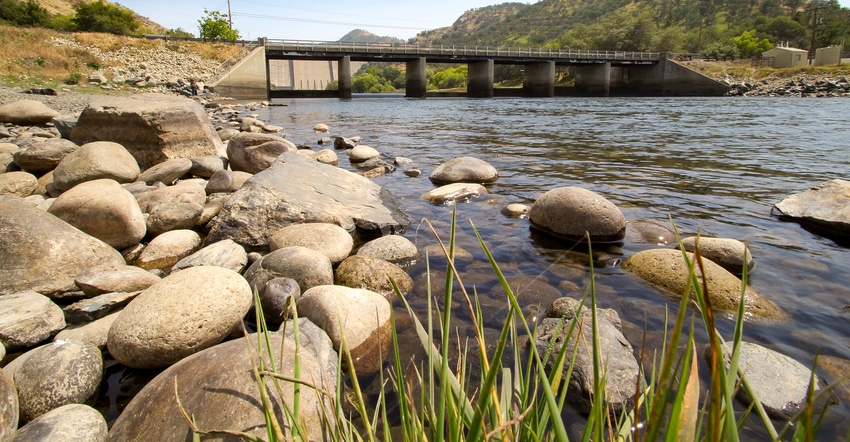
California agricultural land values that are rising and falling the most are doing so under the perception of water availability – no surprise there. This is putting farmland in the Fresno Irrigation District (FID) in a positive light as that agency has done a good job over the years managing conjunctive use of irrigation water.
The annual release of the Trends Report, a lengthy compilation of data collected by professional appraisers and farm managers in California, is starting to shed light on the role the Sustainable Groundwater Management Act (SGMA) is having in setting farmland values. With the call for groundwater sustainability plans by the State of California last year, buyers and sellers are starting to see the writing on the wall for some locations.
Irrigation water supplies vary widely throughout the state. In the southern San Joaquin Valley counties of Kings, Kern and Tulare, appraisers say the attraction of FID became evident in 2020 as land values in neighboring areas remained flat or perhaps began to decline. The stated reason for this: water availability and the perception that it will no longer be plentiful for growers without ample supplies of surface and ground water sources.
Cropland sale prices in Tulare County varied widely in 2020. This trend started in about 2015 and has continued. Land values that once ranged just a few thousand dollars per acre between the top and bottom sales price now range at least $20,000 per acre because of water availability and the perception that it will continue to be available. This is being seen most dramatically in the southern half of the county where early indications from published groundwater sustainability plans under SGMA suggest a limited amount of groundwater pumping will be allowed in that region.
Conversely, the groundwater subbasin in northern Tulare County did not propose pumping restrictions in its state-mandated plan. That has been called into question by some in the water world because of the region's status as a significantly over drafted groundwater basin.
Fresno Irrigation District
Janie Gatzman, an independent rural appraiser and one of two co-chairs of the annual Trends Report issued by the state chapter of the American Society of Farm Managers and Rural Appraisers (ASFMRA), said buyer interest in FID can be simply attributed to the reliable dual source of irrigation water within the district that covers a significant portion of central Fresno County, including the City of Fresno.
FID Board Chairman Ryan Jacobsen said the district continues to focus on good conjunctive use policies that use surface water supplies for irrigation deliveries and groundwater recharge programs.
"We're fortunate as a district because we've been practicing conjunctive use for decades," he said. "Most of our soils in our district recharge very well."
Jacobsen also pointed to a neighboring water district with significant groundwater recharge capabilities from wet-year water flows off the Kings River.
Land values
Farmland in neighboring Tulare County sold for between $9,500 and $31,000 an acre in 2020. While the high end of that range came from the Kaweah sub-basin in the northern part of the county, land with projected pumping restrictions further south in the Tulare sub-basin commanded prices at the bottom of that range.
A similar story out of eastern Fresno County saw land with wells-only trading at between $10,000 and $15,000 an acre while properties with access to wells and FID deliveries traded from between $16,000 and $32,000 an acre.
Elsewhere in the state land values are becoming increasingly tied to projected long-term groundwater availability and the access to reliable surface water supplies. The Sacramento Valley, because of its wetter climate and closer access to the Sacramento and Feather rivers is one area in the state to enjoy more reliable water.
Conversely, districts south of the San Joaquin River Delta with federal water contracts have tended to fall short of water deliveries, particularly those without senior water rights. Once notable exception is the Westlands Water District, which Gatzman says has been successful in finding and wheeling water to the highest bidder based on its proximity to large conveyance projects.
Gatzman said that Westlands was able to eliminate restrictions on land holdings any one person or group could have in the district last year after paying off a federal loan. With that move it opened larger tracts of property in the district to institutional buyers and investors with the capital to pay the higher water costs commanded on the open market.
"When you're a bigger grower like that you have more power to negotiate water transfers," she said. "They have the facilities to transfer water to the district, so it's been pretty easy to transfer water there because of the infrastructure."
Surprises?
Gatzman said she was somewhat surprised that some land values did not fall as much as they did in portions of Kern and Kings counties because of pending water restrictions under SGMA.
"I think once the GSP's get a little more realistic on their restrictions we're going to see some more land value declines," she said.
About the Author(s)
You May Also Like






